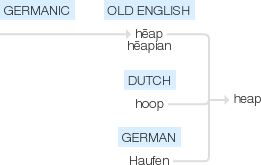Heap
Old English hēap (noun), hēapian (verb), of Germanic origin; related to Dutch hoop and German Haufen .
wiktionary
From Middle English heep, from Old English hēap, from Proto-West Germanic *haup, from Proto-Germanic *haupaz (compare Dutch hoop, German Low German Hupen, German Haufen), from Proto-Indo-European *koupos(“hill”) (compare Lithuanian kaũpas, Albanian qipi(“stack”), Avestan 𐬐𐬂𐬟𐬀 (kåfa)).
etymonline
heap (n.)
Old English heap "pile (of things); great number, crowd, multitude (of persons)," from West Germanic *haupaz (source also of Old Saxon hop, Old Frisian hap, Middle Low German hupe, Dutch hoop, German Haufe "heap"), of uncertain origin. The group is perhaps related to Old English heah "high" (see high), but OED suggests a common origin with Latin cubare "lie down," and Boutkan says it is probably not Indo-European at all.
Slang meaning "old car" is attested from 1924. Earlier it meant "slovenly woman" (1806). As a characteristic word in American Indian English speech, "a lot, a great deal," by 1832.
One grain of sand does not make a heap. A second grain of sand added to the first does not make a heap. Indeed each and every grain of sand, when added to the others, does not make a heap which was not a heap before. Therefore, all the grains of sand in existence can still not a heap make. [the fallacy of the heap, as described in Malcolm Murray and Nebojsa Kujundzic, "Critical Reflection," 2005]
heap (v.)
Old English heapian "collect, heap up, bring together;" from heap (n.). Related: Heaped; heaping. Compare Old High German houfon, German haufen "to heap," also a verb from a noun.
